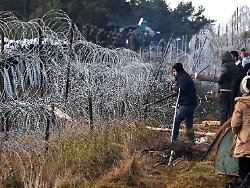Tuesday, November 9th, 2021
Migrants at the EU’s external border
What Lukashenko is doing is a stress test for Europe
A guest contribution by Jakob Wöllenstein and David Gregosz
For the European Union, the situation on the Belarusian border is a challenge in several ways. The tense relationship between Warsaw and Brussels doesn’t make a solution any easier.
If you want to know how capable the European Union is, you should follow the current developments on the Polish-Belarusian border. There, the Belarusian ruler Alexander Lukashenko subjects the European states to a stress test and checks their resilience in fundamental questions of values.
It has been known since 2015 at the latest that the issue of migration is explosive and has a significant impact on the future of the EU. On the one hand, the development on the Polish-Belarusian border again illustrates the need for a coherent European asylum policy. On the other hand, a common European foreign policy is needed to parry the provocation. It is doubtful whether the current Polish government is really interested. In any case, the ruling party PiS is unabashedly exploiting the lack of both elements domestically.
One thing has to be admitted: Lukashenko’s tactic of destabilization currently seems to be working. The European democracies are coming under pressure because they cannot morally justify the fact that people freeze to death at the EU border in winter. According to estimates, there are currently around 15,000 migrants from the Middle East in Belarus who – attracted by the false promise of an uncomplicated onward journey – are aiming for the EU. They are driven by a lack of prospects, but presumably only a minority will really be able to claim asylum. Regardless of this, there is a threat of a humanitarian catastrophe at Poland’s external EU border if people are first forced into forests, swamps and even border rivers by force and then driven back.
Quite a few in the EU are now calling for high walls and the technology of the border. But that alone cannot solve the dilemma. Modern border systems to reduce and properly locate irregular border crossings are necessary. The real question that Lukashenko is currently asking us is whether the rule of law and the much-cited European values also apply under pressure. Can it really be a European approach to send whole families back into the cold by force – because of the flight route, there are many women and children there? This is likely to become increasingly difficult even for die-hard border guards. The EU cannot seriously get involved in a “race of escalation” with an unscrupulous dictator for the purpose of deterrence.
The conclusion should be the first humanitarian aid in Poland supported by the EU. Then it has to be clarified quickly who of the arriving people is actually entitled to asylum, which is likely to be a clear minority in order to consistently return the others to their home countries. Those who are actually in need of protection need to be distributed in Europe. At the same time, all levers should be set in motion to prevent further irregular migration via Belarus from the outset. Information campaigns are necessary so that people do not believe the lies and start the dangerous journey. In the case of Iraq, diplomatic efforts towards the countries of origin and transit have already resulted in the fact that there are no more direct flights to Minsk. According to their own reports, migrants are currently flying indirectly via Istanbul, but increasingly also via Moscow and Damascus. With Ankara, the EU will surely find solutions with sufficient prioritization, especially since the current Polish government maintains a solid relationship with Turkey.
Whether a common strategy can be found against Russia’s ruler Vladimir Putin is the question that makes this dispute a crucial moment for the EU. Lukashenko offers the EU to negotiate a solution to this crisis, which he himself brought about. However, Europe must not allow itself to be blackmailed. A dialogue is fundamentally necessary and the EU should be ready to conduct it – but it should rather serve to resolve the political crisis in Belarus as a whole, which is increasingly having an impact on security in the region. The democratic forces and Belarusian civil society should also be involved in such a conversation. The key to this lies in Minsk, but it will not work without the Kremlin.
In the meantime, the PiS government seems to be in a bind, as has so often been the case recently. On the one hand, the advantages of European cooperation on the subject of migration are obvious, as more resources (such as the involvement of the European border agency Frontex) and diplomatic force could be mobilized to deal with the problem. On the other hand, Prime Minister Mateusz Morawiecki cannot move an inch in the direction of Brussels in terms of domestic politics with ongoing EU criticism and polemics against refugees without losing votes to the right-wing party spectrum.
Lukashenko’s stress test affects the European Union on a variety of levels. The member states of the EU must recognize this in order to take away the deterrent potential of this hybrid threat.
Jakob Wöllenstein heads the international office of the Konrad Adenauer Foundation Belarus based in Vilnius. David Gregosz heads the international office of the Konrad-Adenauer-Stiftung Poland based in Warsaw.
